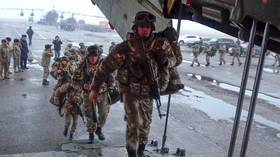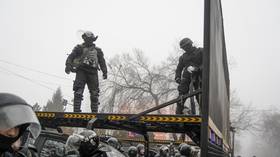RT freelance reporter released after arrest in Kazakhstan
Freelance reporter Stanislav Obishchenko was on Saturday detained by members of the military while working in Kazakhstan’s largest city of Almaty, which has been hit by violent protests. The journalist has since been released.
A group of RT journalists, who on Saturday arrived in Almaty to report on the situation there, were working in one of the central streets when the incident happened.
“Our team arrived from [the capital city of] Nur-Sultan to Almaty, and set out to film a stand-up report in a church. It then went to Republic Square to film the military vehicles there. One of our war correspondents was working across the road when a military vehicle approached him. He was made to kneel, threatened with a rifle, and then forced into the vehicle. Unfortunately, our team couldn’t make contact with him thereafter. We’re now trying to do so with the help of the [Russian] Embassy,” said RT Russia producer Mikhail Krasnov.
Obishchenko confirmed late on Saturday that he was set free after spending hours in detention. With mobile and internet connection still undergoing a blackout in Kazakhstan, he managed to talk to his wife by phone from a hotel.
Almaty has been a hotspot of the unrest in Kazakhstan, which began a mass protest over economic grievances on January 2. The original peaceful demonstrations reflected public discontent over a sharp increase in prices for liquefied petroleum gas. However, just three days into the protests, groups of rioters, arsonists and looters came to dominate the events.
Footage from Almaty showed the city administration building, located in Republic Square, ransacked and charred after fire raged there for days. Many central businesses have been broken into and looted, as burnt and smashed police and civilian vehicles could be seen blocking the streets. Several media offices have reportedly been broken into by groups armed with axes and tools, who meticulously destroyed all of the equipment inside. Many ATMs have been wrenched open, causing severe problems with cash withdrawal for the residents.
An attempt to take over Almaty International Airport has also been made, but the rioters, armed with improvised weapons, largely focused on looting the duty free shops, without causing any damage to the runway. The airport has since been secured, with all civilian flights currently canceled. Firearms have also apparently been used in confrontations, with plenty of weapons looted from retreating law enforcers and barracks, all of which has been captured on video.
Kazakh police also claimed that their city headquarters came under several waves of armed attacks, in which they said dozens of assailants were killed by return fire.
Kazakh President Kassym-Jomart Tokayev responded to the initial mass protests by making concessions, regulating gas prices and reshuffling his government, but this appeared to have little effect. He has since taken a tougher stance, imposing a countrywide state of emergency and ordering law enforcement to "shoot to kill without warning" if they are met with armed resistance.
Tokayev claims that organized groups of "terrorists," including unspecified non-Kazakh citizens, are behind the escalation in violence. The president cited this threat in justifying his decision to request military assistance from the Collective Security Treaty Organization (CSTO), the Russian-led bloc made up of six former Soviet Union countries, which has since dispatched peacekeeping troops to Kazakhstan.
It is still unclear how many people have been caught in the violence, but the reported figures say dozens have been killed and hundreds injured, including police. More than 4,400 people have officially been detained.














